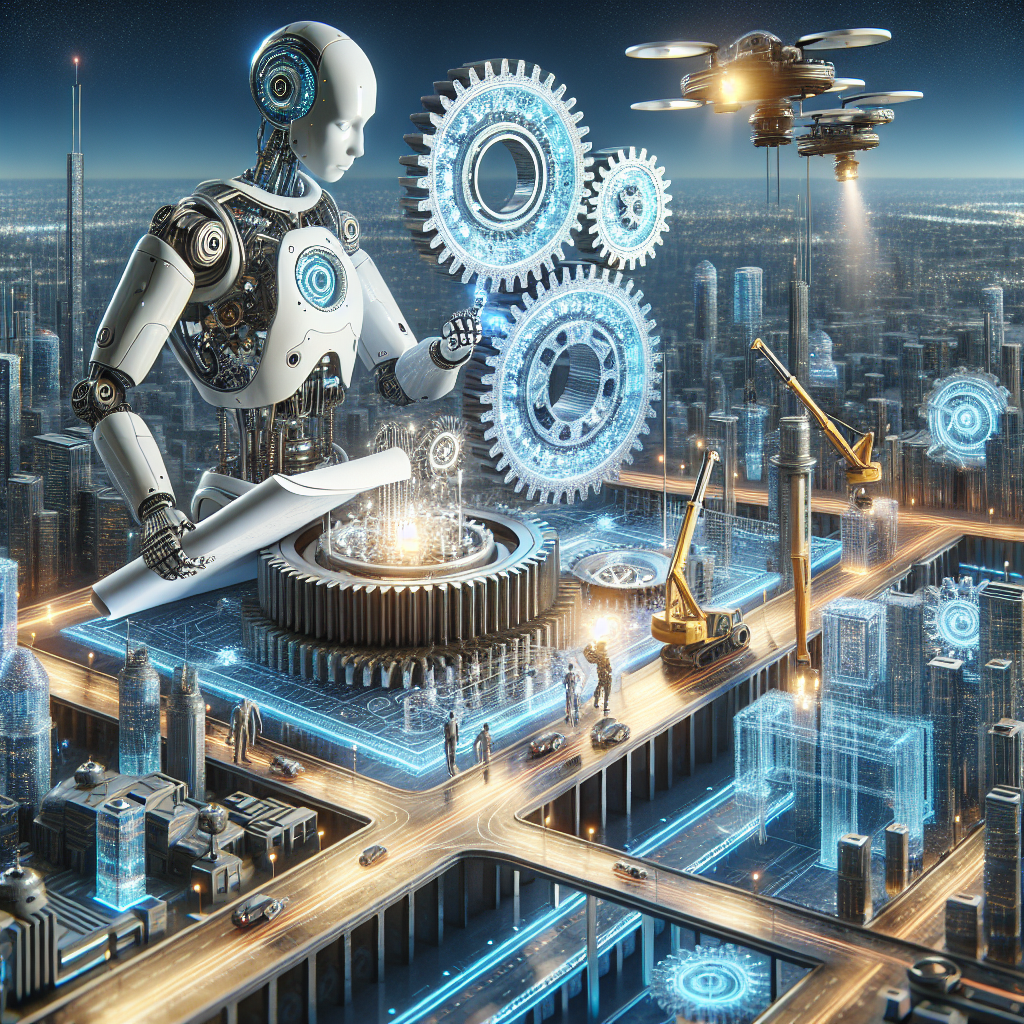In recent years, artificial intelligence (AI) has been revolutionizing various industries, including infrastructure development and maintenance. AI technology has the potential to significantly improve the efficiency, safety, and sustainability of infrastructure projects. In this article, we will explore the role of AI in infrastructure development and maintenance and the benefits it brings to the industry.
AI in Infrastructure Development:
1. Planning and Design:
AI can be used to analyze large datasets and generate insights that can inform the planning and design of infrastructure projects. AI algorithms can help optimize routes, determine the best locations for infrastructure projects, and predict potential risks and challenges. This can lead to more cost-effective and sustainable infrastructure designs.
2. Project Management:
AI can streamline project management processes by automating tasks such as scheduling, resource allocation, and progress tracking. AI-powered project management tools can help project managers make data-driven decisions and identify potential issues before they escalate. This can improve project efficiency and reduce the likelihood of delays and cost overruns.
3. Construction:
AI can enhance construction processes by enabling real-time monitoring of construction sites, analyzing construction data, and optimizing resource allocation. AI-powered drones and robots can be used to inspect construction sites, monitor progress, and perform repetitive tasks. This can improve safety, productivity, and quality control on construction sites.
4. Maintenance and Monitoring:
AI can facilitate predictive maintenance of infrastructure assets by analyzing sensor data and predicting potential failures before they occur. AI algorithms can help asset managers prioritize maintenance tasks, optimize maintenance schedules, and reduce downtime. This can extend the lifespan of infrastructure assets and reduce maintenance costs.
5. Sustainability:
AI can play a crucial role in promoting sustainability in infrastructure development. AI algorithms can help optimize energy consumption, reduce waste, and minimize environmental impact. AI-powered sensors can monitor air and water quality, detect leaks and emissions, and ensure compliance with environmental regulations. This can help create more sustainable and environmentally-friendly infrastructure projects.
AI in Infrastructure Maintenance:
1. Predictive Maintenance:
AI can enable predictive maintenance of infrastructure assets by analyzing historical data, monitoring asset performance, and predicting potential failures. AI algorithms can help asset managers identify maintenance needs, optimize maintenance schedules, and reduce downtime. This can improve asset reliability, extend asset lifespan, and reduce maintenance costs.
2. Condition Monitoring:
AI can facilitate real-time condition monitoring of infrastructure assets by analyzing sensor data, detecting anomalies, and predicting potential issues. AI-powered sensors can monitor asset performance, detect abnormalities, and trigger alerts when maintenance is required. This can help asset managers proactively address maintenance needs and prevent costly failures.
3. Asset Management:
AI can enhance asset management processes by providing insights into asset performance, maintenance needs, and lifecycle costs. AI algorithms can help asset managers optimize asset utilization, prioritize maintenance tasks, and make informed decisions about asset replacement or upgrade. This can improve asset reliability, reduce maintenance costs, and maximize asset lifespan.
4. Remote Maintenance:
AI can enable remote maintenance of infrastructure assets by leveraging technologies such as IoT, drones, and robots. AI-powered drones and robots can inspect assets, perform maintenance tasks, and collect data remotely. This can reduce the need for on-site maintenance personnel, minimize safety risks, and improve maintenance efficiency.
5. Data Analytics:
AI can facilitate data analytics of infrastructure assets by analyzing large datasets, identifying patterns, and generating insights. AI algorithms can help asset managers monitor asset performance, predict maintenance needs, and optimize asset management strategies. This can improve decision-making, enhance asset reliability, and reduce maintenance costs.
FAQs:
1. What are the benefits of using AI in infrastructure development and maintenance?
AI can improve efficiency, safety, and sustainability in infrastructure projects. AI technology can optimize project planning and design, streamline project management processes, enhance construction processes, facilitate predictive maintenance, and promote sustainability. This can lead to cost savings, improved asset reliability, reduced downtime, and enhanced environmental performance.
2. How can AI help with predictive maintenance of infrastructure assets?
AI can enable predictive maintenance by analyzing historical data, monitoring asset performance, and predicting potential failures. AI algorithms can help asset managers identify maintenance needs, optimize maintenance schedules, and reduce downtime. This can improve asset reliability, extend asset lifespan, and reduce maintenance costs.
3. What role does AI play in monitoring infrastructure assets?
AI can facilitate real-time monitoring of infrastructure assets by analyzing sensor data, detecting anomalies, and predicting potential issues. AI-powered sensors can monitor asset performance, detect abnormalities, and trigger alerts when maintenance is required. This can help asset managers proactively address maintenance needs and prevent costly failures.
4. How can AI enhance asset management processes?
AI can provide insights into asset performance, maintenance needs, and lifecycle costs. AI algorithms can help asset managers optimize asset utilization, prioritize maintenance tasks, and make informed decisions about asset replacement or upgrade. This can improve asset reliability, reduce maintenance costs, and maximize asset lifespan.
5. What are some examples of AI applications in infrastructure development and maintenance?
AI applications in infrastructure development and maintenance include AI-powered project management tools, drones and robots for construction site monitoring, predictive maintenance algorithms, condition monitoring sensors, remote maintenance technologies, and data analytics platforms. These AI applications can improve efficiency, safety, and sustainability in infrastructure projects.
In conclusion, AI technology has the potential to transform infrastructure development and maintenance by improving efficiency, safety, and sustainability. AI algorithms can optimize project planning and design, streamline project management processes, enhance construction processes, facilitate predictive maintenance, and promote sustainability. By leveraging AI technology, infrastructure stakeholders can make data-driven decisions, proactively address maintenance needs, and maximize asset performance. As AI continues to advance, its role in infrastructure development and maintenance will become increasingly important in driving innovation and progress in the industry.

